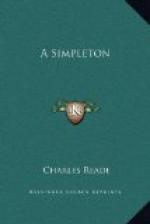When the struggle was over, and the fatal resolution taken, then he became calmer, less solitary, and more sociable.
Phoebe, who was secretly watching him with a woman’s eye, observed this change in him, and, with benevolent intentions, invited him one day to ride round the farm with her. He consented readily. She showed him the fields devoted to maize and wheat, and then the sheepfolds. Tim’s sheep were apparently deserted; but he was discovered swinging head downwards from the branch of a camel-thorn, and seeing him, it did strike one that if he had had a tail he would have been swinging by that. Phoebe called to him: he never answered, but set off running to her, and landed himself under her nose in a wheel somersault.
“I hope you are watching them, Tim,” said his mistress.
“Iss, missy, always washing ’em.”
“Why, there’s one straying towards the wood now.”
“He not go far,” said Tim coolly. The young monkey stole off a little way, then fell flat, and uttered the cry of a jackal, with startling precision. Back went the sheep to his comrades post haste, and Tim effected a somersault and a chuckle.
“You are a clever boy,” said Phoebe. “So that is how you manage them.”
“Dat one way, missy,” said Tim, not caring to reveal all his resources at once.
Then Phoebe rode on, and showed Christopher the ostrich pan. It was a large basin, a form the soil often takes in these parts; and in it strutted several full-grown ostriches and their young, bred on the premises. There was a little dam of water, and plenty of food about. They were herded by a Kafir infant of about six, black, glossy, fat, and clean, being in the water six times a day.
Sometimes one of the older birds would show an inclination to stray out of the pan. Then the infant rolled after her, and tapped her ankles with a wand. She instantly came back, but without any loss of dignity, for she strutted with her nose in the air, affecting completely to ignore the inferior little animal, that was nevertheless controlling her movements. “There’s a farce,” said Phoebe. “But you would not believe the money they cost me, nor the money they bring me in. Grain will not sell here for a quarter its value: and we can’t afford to send it to Cape Town, twenty days and back; but finery, that sells everywhere. I gather sixty pounds the year off those poor fowls’ backs—clear profit.”
She showed him the granary, and told him there wasn’t such another in Africa. This farm had belonged to one of the old Dutch settlers, and that breed had been going down this many a year. “You see, sir, Dick and I being English, and not downright in want of money, we can’t bring ourselves to sell grain to the middlemen for nothing, so we store it, hoping for better times, that maybe will never come. Now I’ll show you how the dam is made.”
They inspected the dam all round. “This is our best friend of all,” said she. “Without this the sun would turn us all to tinder,—crops, flowers, beasts, and folk.”




